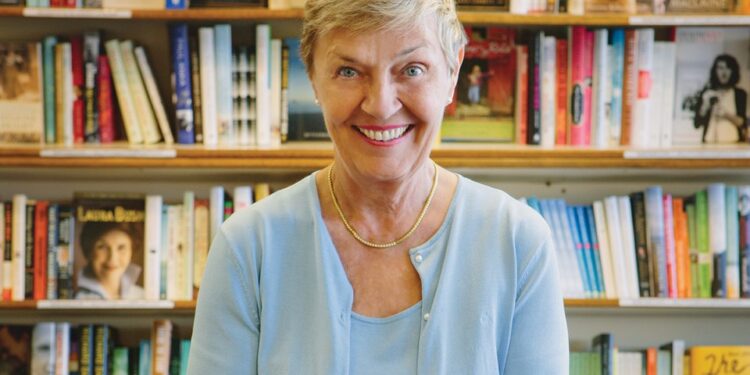The grande dame of Omaha book clubs began as a sewing club 90 years ago. Women in white gloves and cloche hats met in homes for elegant Monday lunches.
They read such books as E.M. Forster’s Passage to India and F. Scott Fitzgerald’s Tales of the Jazz Age. Founding members were indeed living in the Jazz Age—also called the Roaring Twenties. Women who began the club in 1924 most likely bought their books from Matthews Book Store at 1620 Harney St. In those days, a new book cost about 50 cents.
High school-age “book boys” were paid to pick up books from members’ homes and take them to other members’ homes so they could be shared. Interesting side note: There are only two “book girls” on record.
Member Lois Reynolds inherited a piece of the club’s history when she received 24 luncheon trays and other items from when her mother-in-law, Laura Reynolds, hosted the Monday Book Club.
Reynolds remembers in the 1960s when her future husband’s mother would talk about the elegant luncheons.
“It was a big deal to get ready for the ladies coming for lunch,” says Reynolds. “They got out their silver and good serving pieces.” Hostesses brought out their best china and linens.
But times changed and so did the club. Members started meeting at city clubs, restaurants, and even a bowling alley.
They met at the Hilltop House. It closed. They met at the legendary Blackstone Hotel. It closed. They met at the Omaha Club, Younkers, the Ranch Bowl, the Fireside Restaurant, and the Sky Room at the Center. All were Omaha landmarks that have since closed.
“When I joined we were at the Plaza Club Cloud Room, which has since closed,” says Karen Kennedy, president of the Monday Book Club, which she says is Omaha’s oldest active book club.
“We now meet at the Omaha Country Club, but on Fridays, since we learned that country clubs are closed on Mondays.”
Yes, that’s right. The Monday Book Club meets on Fridays.
“We used to have hostesses for centerpieces and menus. But when we went to the Omaha Country Club, it became easier if we paid an annual membership fee,” says Kennedy, a member for 14 years.
“Dues are now $135, which includes lunch, operating expenses, an annual donation to a charity, and occasional speakers.”
Members now bring their books for sharing with others to the monthly luncheon meetings (the “book boys” lost their jobs), which are held October through May.
Speakers are sometimes invited to talk about such topics as making a will, writing a book, poetry, and safe driving. A slide show about the coronation of Queen Elizabeth was a 1955 luncheon program. In 1957, the speaker was an anthropologist.
Most of the club’s 40 members buy books at the locally owned The Bookworm, where they receive a discount.
“We then take the book to the first meeting, check it out for a month, and bring it back to the next luncheon meeting,” says Kennedy. “This way we get a variety of books. We hope they read something they otherwise may not. We share the love of good books and good company.”
When Beth Black moved The Bookworm to Countryside Plaza in 1999, she inherited many book clubs from the Village Bookstore that had been located there, including the Monday Book Club.
“We have more than 60 active registered book clubs,” says Black, co-owner of the bookstore. “Only about a dozen are like the Monday Book Club, old-fashioned book clubs that pass books on to members but don’t discuss them.”
“It is old-fashioned,” agrees Kennedy. “That’s a fine word. It’s about fun and friendship.”
Members ask Black and her staff at The Bookworm for recommendations. The store keeps a list of the books that members buy, so they do not duplicate each other’s purchases.
The book club’s members decided to stop exchanging holiday gifts at the Christmas luncheons and instead give money each year “to an organization that we believe in,” says Kennedy.
Donations have been made to such nonprofits as Child Saving Institute, CASA, The Salvation Army, and the Stephen Center. Most significant for a book club are donations to literacy and the library foundations and the Omaha Public Library.
Few of the book club’s records go back before the 1950s, says Kennedy, but the group’s history is perhaps best told in bloodlines.
The Reynolds are a prime example of how families have passed participation in the Monday Book Club down through generations. Lois has been a member for six years; her mother-in-law was a member for 40 years; her husband’s aunt, Louise Reynolds, also was a long-time member.
Members’ names over the years have included those of well-known individuals in the community. Presently all members of the venerable club are women.
What if a man wanted to join the all-female group? “I don’t think we would turn them away,” says Kennedy.











